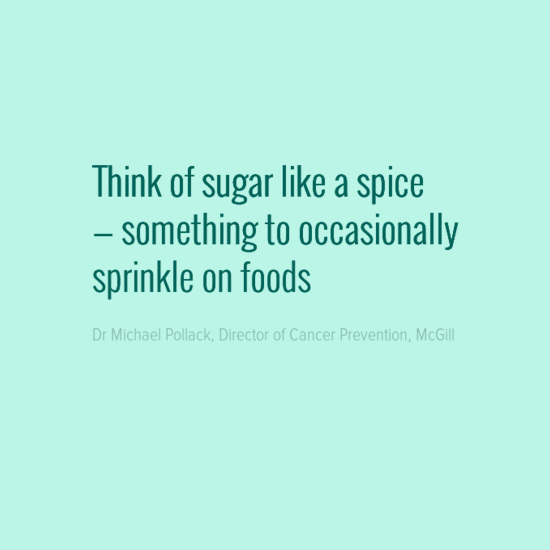
Never mind Black Friday, you know it’s nearly Christmas when the Quality Street and mince pies start circulating in the office. And don’t get me wrong – I’m rarely the person who says ‘No’ to a mid-afternoon sweet treat at this time of year. But we know that refined sugar is no friend to healthy ageing.
Refined sugar impacts every facet of our health. And cancer, which devastates so many lives, is no exception. A shocking report was published this week, which re-evaluates research done in Birmingham in the 1960s. The 50-year-old research appears to have uncovered a link between sugar intake and cancer (specifically, bladder cancer) but the initial research was funded by the Sugar Research Foundation. Funding was pulled when the sugar-cancer link was made and the findings were forgotten until now. There could have been all sorts of reasons for this but isn’t it awful? Makes me very cross.
With that in mind, I’ve been researching sugar, diet and cancer in recent days and these are five key points:
- More than 1 in 20 cancers in the UK are linked to being overweight or obese. And Cancer Research UK says ‘being overweight is the biggest single preventable cause of cancer after smoking.’ Being overweight is also linked to 13 types of cancer.
- Sugar can cause weight gain, of course, but does it actually, ‘cause cancer’? No, says Cancer Research. Healthy cells, and cancer cells, both use glucose in different ways. Healthy cells create energy using the mitochondria, cancer cells bypass this process. Known as the Warburg Effect, this allows cancer cells to generate energy more rapidly to meet demand.
- Scientists are trying to understand how to shut down energy generation by cancer cells without starving healthy cells. But it’s not a question of simply changing diet – read this from Cancer Research UK http://scienceblog.cancerresearchuk.org/2017/04/19/taking-advantage-of-cancers-abnormal-metabolism-could-lead-to-a-new-way-to-starve-tumours/
- Another area of research currently attracting widespread interest is insulin. Lewis Cantley, director of the Cancer Centre at Weill Cornell Medicine in the US, believes it may be the foods that spike insulin that need investigating rather than body weight. So simple sugars and carbs, which elevate insulin levels, are the real danger, rather than what we see on the scales.
- His research reveals how insulin activates the signalling pathway known as PI3-kinase: the key to the growth of many cancers. He says “So if you follow the logic that anything that drives activation of PI3-kinase ultimately results in cancer, and that insulin is the best way to do it, then that suggests that having high levels of insulin is likely to drive your cancer. And what drives insulin levels is sugar.”
So the next time the Quality Street come round I’ll try to remember that while this is the season of sugar and spice, it’s time to start treating sugar itself as a spice.
Susan


I am delighted that you have raised this. My husband was diagnosed with advanced prostate cancer, which has spread to his bones, 3 years ago (weight not an issue). Almost the first thing he discovered when researching how best to help himself was the sugar/cancer link. He mentioned this to the NHS oncologist, who at first said she was unaware of the fact – and then admitted that she knew about it but ‘we don’t tell patients’. We were flabbergasted – why not tell people about the one relatively easy thing they can do which might help slow down cancer growth? We are not naive enough to speak of ‘cure’. He has been given no dietary advice whatsoever by the NHS, but follows a ketogenic diet.
Thank you so much for sharing this Hilary. Do you think the ketogenic diet has made a difference?